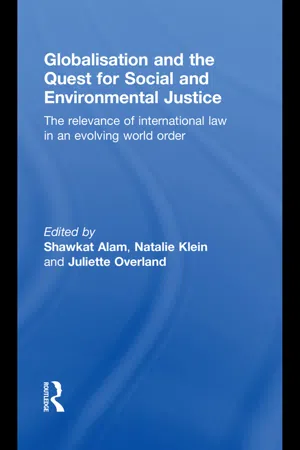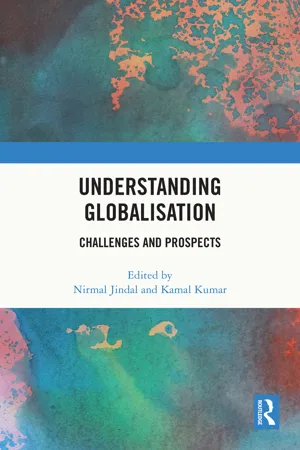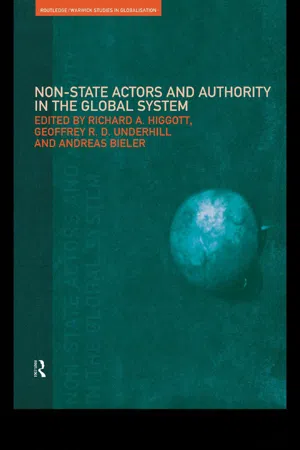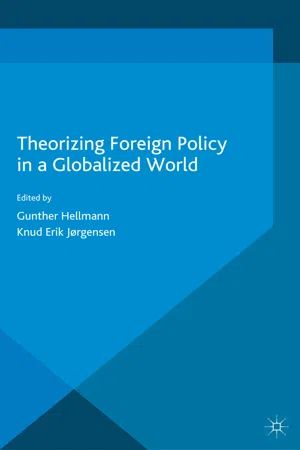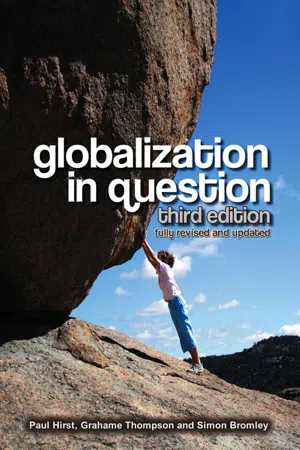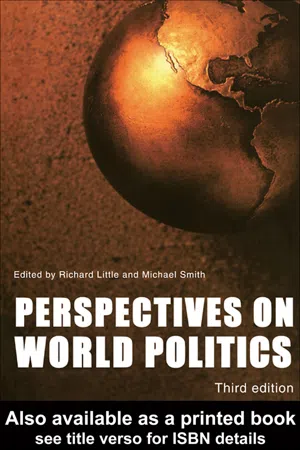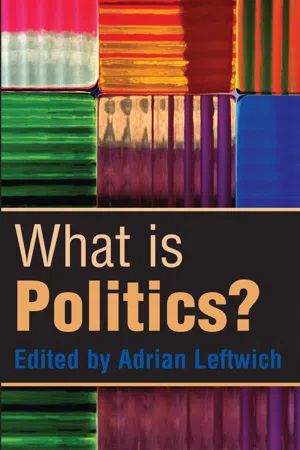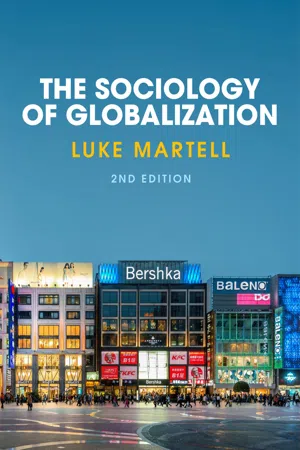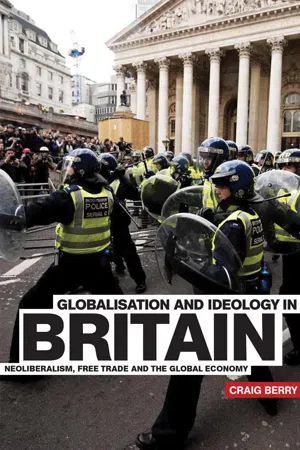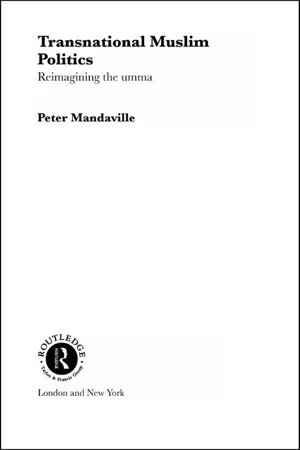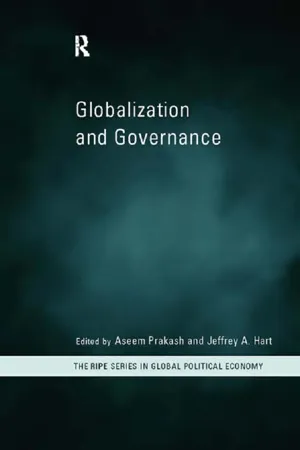Politics & International Relations
Impact of Globalisation on the State
Globalization has transformed the role of the state by diminishing its sovereignty and increasing interdependence among nations. This has led to a shift in power dynamics, with non-state actors gaining influence. States now face challenges in regulating global economic activities and maintaining control over their domestic affairs, leading to debates about the impact of globalization on state authority and governance.
Written by Perlego with AI-assistance
Related key terms
Related key terms
1 of 4
Related key terms
1 of 3
12 Key excerpts on "Impact of Globalisation on the State"
- eBook - ePub
Globalisation and the Quest for Social and Environmental Justice
The Relevance of International Law in an Evolving World Order
- Shawkat Alam, Natalie Klein, Juliette Overland(Authors)
- 2010(Publication Date)
- Routledge(Publisher)
5Globalisation poses significant challenges for international law, as it has transformed many aspects of the discipline. These include expansion of the subjects and objects of international law and a reconceptualisation of the concept of sovereignty, the role of the State, and the locus of authority and legitimacy in the international arena to prescribe, interpret, apply and enforce international law norms. However, although it is not generally acknowledged, international law must be seen not merely as reacting to the forces of globalisation, but also affecting the direction of globalisation.The multifaceted nature of globalisation notwithstanding, the discussion in this chapter will be confined to its economic and political aspects with international law implications. The economic and political aspects of globalisation will be examined, discussing the changing role of the State in managing the impact of globalisation in their respective areas. The implications of these developments for international law will be studied prior to the concluding section.Economic globalisation and the changing role of the State
Economic integration of markets has turned the world into a global marketplace. It has accelerated the transborder flow of goods, services and capital. Foreign direct investments and transfer of technology, coupled with economic reforms and liberalisation in countries such as China and India,6 have transformed economies in several developing countries;7 this phenomenon is clearly manifested by the growing number of new emerging markets. However, the progress has been uneven, as many sub-Saharan countries are left out of the process, and the benefits of globalisation have not reached the poor in the developing world.8 - eBook - ePub
Understanding Globalisation
Challenges and Prospects
- Nirmal Jindal, Kamal Kumar, Nirmal Jindal, Kamal Kumar(Authors)
- 2023(Publication Date)
- Routledge India(Publisher)
All these developments challenge the sovereignty of nation states. But some scholars are of the opinion that sovereignty as a concept is still a critical feature of nation states. Globalisation, international law, international organisations, hegemonic powers, and a world economy only redefine the meaning of State sovereignty. Situations such as terrorism, war, and peace reinforce the importance of State sovereignty and make it more legitimate and accountable. Some scholars are of the opinion that States are the real forces driving globalisation. They author, promote, and shape globalisation. The changing role of the State because of globalisation leads to their adapting to the transformations in the international scenario. They are able to do this through the idea of pooled sovereignty.Michael Mann (1997) analyses four proposed threats to nation states. These threats are ‘global capitalism and capitalist transformation, environmental danger, identity politics and post nuclear geopolitics’. Capitalist transformations are weakening the nation states of the North. However, economic development would strengthen Southern nation states. The decline of hard geopolitics in a post–nuclear age weakens the North but not the Southern States. Identity politics strengthens nationally bound politics. According to Mann, all the features and threats make it too varied to argue either in favor or against the strengthening of nation states. Mann argues that to be able to better understand the role of States and globalisation, one needs to make a distinction between States. Globalisation affects powerful and stronger States differently than weaker and less powerful States (Mann 1997 ).Differences in the degree of power among States in the international arena push some States into positions of passive victims while others become aggressive agents. Similarly, outside involvement through foreign direct investments (FDIs) in trade and finance undermines the political authority of the weaker States. It pushes them into situations of economic dependency. Globalisation has also created an added pressure on nation states to strengthen their defence and military mechanisms. These developments put State sovereignty in a state of dilemma. Paul Hirst argues that ‘a world economy with a high degree of trade and investment is not necessarily a globalized economy’. According to him, as long as nation states are important, sovereignty will be important (Hirst 1999 ). Thus, we see that nation states are important for both democracy and development. It is only through nation states that poor and weak countries can shape rules and institutions in their favour, especially in an unequal world. In a similar vein, Wolf argues that the ‘proposition that globalization makes states unnecessary is even less credible than the idea that it makes states impotent’ (Wolf 2002 ). According to Wolf, the opposite of this proposition is more true for three reasons. According to him, the ability of a society to take advantage of the opportunities offered by international economic integration depends on the quality of public goods. Along with this, the State defines identity. A sense of belonging forms a sense of security. Last, international governance rests on the guarantee of stability provided by the individual States. Thus, according to Wolf, globalisation does not make states unnecessary. On the other hand, for people to exploit the opportunities of international integration, a state is needed at both ends of these transactions (Wolf 2001 - Andreas Bieler, Richard Higgott, Geoffrey Underhill(Authors)
- 2004(Publication Date)
- Routledge(Publisher)
Introduction Globalisation and non-state actors Richard A.Higgott, Geoffrey R.D.Underhill and Andreas BielerTraditionally, in International Relations (IR), power and authority were considered to rest with states. This has recently come under scrutiny empirically and theoretically due to the changes associated with ‘globalisation’. Globalisation is a complex concept. Two extreme versions oppose each other. Globalists, especially prior to the economic meltdown of 1997–8, regard globalisation as moving inevitably to a borderless world and economic ‘level playing field’, on which truly global companies are the primary actors. There is little or no role left to states beyond the provision of infrastructure and public goods required by business (Ohmae 1990 and 1995). In more nuanced fashion, Strange talks about an increasing hollowness of state authority or a ‘retreat of the state’ (Strange 1996). Conversely, internationalists consider states to be still the main actors in international economics and politics. Hirst and Thompson argue that the economy is predominantly international, not global, and that therefore states, although in a slightly different way, still play a central role in its governance (Hirst and Thompson 1996:178–89). The changes are called internationalisation, not globalisation, and are defined as a drastic increase in cross-border flows of goods, services and capital (Keohane and Milner 1996).This collection of original essays demonstrates that neither of the two extreme positions adequately conceptualises the role of states and non-state actors under conditions of globalisation. The state has been strengthened in some areas, while it has clearly lost power in others. The role of the state has not diminished, but it has changed. The state has been and continues to be restructured (Weiss 1998). Although states retain a significant degree of importance, a wide range of non-state actors possess increasingly salient capabilities to structure global politics and economics.- eBook - ePub
Future States
From International to Global Political Order
- Stephen Paul Haigh(Author)
- 2016(Publication Date)
- Routledge(Publisher)
I conclude that globalization is a worldwide phenomenon; that in its current, “thick” form it has no historical precedent; and that in spanning the realms of human experience it cannot be reduced to any one of them. Under these circumstances, human relations are in a state of increasing flux. With respect to states, I take up a transformationalist position: globalization affects states, but states are still (and will remain) central to the global political order.In Chapter 3 , I briefly trace the advent of the “Westphalian” state in order to show that it did not just “naturally” occur, but rather was a product of historical contingency. Various ideational and material forces shaped it and, under novel conditions of globalization, it is being recast. The question is, “Into what form?”Part II
The remainder of the book is an attempt to answer that question. At the most basic level, social institutions come into existence to address needs that individuals acting alone cannot hope to answer. Generally speaking, states and the system they comprise are designed to respond to three key needs: physical security; economic viability; and recognition/representation of identity.26 Put another way, they are in the business of delivering a prescribed set of basic goods. Looking ahead, the third and final part of the thesis asks to what extent globalization affects state performance in this regard, and what the various implications of its effects might be.But the goods-delivery model begs fundamental questions about inherent capacity on one hand, and about the closely interrelated notion of legitimacy on the other. Without sustained capacity or acceptance, the state’s ability to carry out vital activities, to discharge its obligations, is severely compromised. Part II , then, is a necessary conceptual step backwards, to a point where we can focus attention on these two enabling qualities.Crucially, the capacity of any entity to perform a function rests on its attributes—and the core attribute of the state has since Westphalia been its possession of sovereignty.27 Chapter 4 - eBook - ePub
- Knud Erik Jørgensen, Knud Erik Jørgensen, Kenneth A. Loparo, Knud Erik Jørgensen, Gunther Hellmann(Authors)
- 2015(Publication Date)
- Palgrave Macmillan(Publisher)
2 allowing them to again make sense of the ‘turbulent’ world politics they were observing (Rosenau, 1990; Rosenau and Czempiel, 1992). Since then, global politics and the debate about it have further evolved. Although at times contested (Held and McGrew, 2002, 11–13; Overbeek, 2010), global governance has established itself as an empirical-analytical concept for understanding and studying this evolution (Dingwerth and Pattberg, 2006; Barnett and Sikkink, 2008; Compagnon, 2010).Global governance provides a conceptual answer to the transformation of world politics from a predominantly state-based to an increasingly intricate multi-actor system, which is accentuated by the more recent shift towards multi-polarity and the ongoing proliferation of non-state players at all levels of policy-making. The repercussions these changes have had for foreign policy have however regularly remained under-conceptualized and under-studied. While foreign policy can be considered as an ‘area of enquiry within the discipline of International Relations’ (Alden and Aran, 2012, 1), it has been deplored that foreign policy analysis (FPA) has often not fully engaged with the rest of the discipline of IR (Carlsnaes, 2002, 331; Houghton, 2007, 26). This seems like a paradox if one considers that the premises of IR theories have regularly informed foreign policy concepts and their analysis, with much ‘eclectic borrowing’ notably from (neo-)realism and neoliberalism (but also from other disciplines like social psychology) (Rittberger, 2001; Smith et al., 2008; Alden and Aran, 2012, 112). Yet, systematic work on the ‘general fault-line between the study of foreign policy (looking from the inside out) [ … ] and the study of international relations’ has indeed been scarce (Clark, 1999, 22). The result is that FPA has especially failed ‘to adequately engage with critical intellectual developments in IR over the last two decades’ (Alden and Aran, 2012, 110). One of these intellectual developments is arguably embodied in the concept of global governance. The debate about what global governance may mean for foreign policy and its analysis remains however quite limited.3 - eBook - ePub
- Paul Hirst, Grahame Thompson, Simon Bromley(Authors)
- 2015(Publication Date)
- Polity(Publisher)
8Globalization, Governance and the Nation-State
Introduction
So far we have been concerned mainly with the economic aspects of globalization, and have considered governance primarily in terms of its economic necessities and possibilities. In this chapter we consider the wider political issues raised by globalization theorists and, in particular, the role of the nation-state in the future of international and global governance.We begin with a reminder that the modern state is a relatively recent phenomenon, and that ‘sovereignty’ in its modern form is a highly distinctive political claim – to exclusive control of a definite territory. We emphasize the international aspects of the development of sovereignty, that agreements between states not to interfere in each other’s internal affairs were important in establishing the power of state over society. We go on to consider the development of the nation-state’s capacity for governance and how these capacities are changing in the modern world, especially after the end of the Cold War, and the turn towards more liberalized and open markets both domestically and internationally.While the capacities of states for governance have changed in some respects (especially as national macroeconomic managers), and many states have lost the ability to act independently, they remain pivotal institutions, especially in terms of creating the conditions for effective international governance. We shall make the following main points in our discussion of the possibilities of governance and the role of the state. - eBook - ePub
- Richard Little, Michael Smith, Richard Little, Michael Smith(Authors)
- 2005(Publication Date)
- Routledge(Publisher)
During the 1990s, these established trends developed further. Indeed, some would say that since the end of the Cold War in the early 1990s, and with the increasing fluidity and diversity of economic, social and political processes, both the world arena and the study of world politics have been transformed. There continues to be a strong focus on the ways in which states have to cope with the impact of global change, drawing on the major changes in the state system during the 1990s and emphasizing the new institutional and negotiating contexts confronting state authorities. Alongside this, however, there has been a further significant development of interest in transnational processes and the influence of non-state actors such as international organizations or cross-national networks of political activists. Accompanying this there has also been a surge of attention to the processes and problems generally described as those of ‘globalization’, in which intensification of transnational linkages in politics, political economy and various forms of communications and information technologies have produced a transformation not only of institutions but also of ideas and cultural interactions.The pieces gathered in this part of the book are selected in order to address some of the key issues that have emerged from these processes of changes and tranformation, and to underline the fact that in many cases ‘old’ institutions and problems have persisted into a transformed political world. The first four selections thus all address the problems of the state as an actor in this changing world, and some of the changed contexts into which state authorities have to project their influence. Shaw (2.1 ) focuses on the ways in which processes of globalization have transformed the nature and activities of states, but he does this within a historical context which emphasizes the role of the ‘Western state’ centred in the North Atlantic, Japan and Australasia. He goes on to suggest that in this way the ‘Western state’ has the potential to become a ‘global state’, in the sense that it is the predominant model for institutions and ideas relating to statehood. But at the same time, he shows that one of the key features of statehood in the age of globalization is the increasing variety of statehood and state authorities, which makes simple prognostications about the models for future forms of statehood a dangerous exercise. Ikenberry (2.2 ) develops further one of the key themes in Shaw’s argument, by focusing on the ways in which the ‘Western state’ in the form of the United States and its allies, has continued to dominate the post-Cold War order. This is not, however, a simple state-centric or power-based argument, since Ikenberry is concerned to show how this Western dominated order is sustained by the moderation of state power, by the building of cooperative processes and institutions and by shared ideas about the ‘logic of order’. Ikenberry thus argues that the ‘Western’ order has ‘constitutional characteristics’ that profoundly modify the realist vision of competitive and hierarchical relations between states. This general argument is illustrated more specifically by Moravcsik (2.3 ), who explores the rationality of international cooperation with specific reference to the European Union. According to Moravcsik, cooperation between states in the European Union has reflected key processes of national preference formation, interstate bargaining and institutional choice, in which the ‘choice for Europe’ has led to pooling or delegation of sovereignty in key areas of state activity. The final selection in this group, by Gary Marks, Elisabeth Hooghe and Kermit Blank (2.4 - eBook - ePub
What is Politics?
The Activity and its Study
- Adrian Leftwich(Author)
- 2015(Publication Date)
- Polity(Publisher)
Deliberation about the global interest presumes the existence of a wider global community, or communities, and ties of solidarity which transcend borders. In the context of intense global and regional interconnectedness, the very idea of political community as an exclusive territorially delimited unit is problematic. In a world in which global warming connects the long-term fate of many Pacific islands to the driving habits of tens of millions of SUV (Sports Utility Vehicle) motorists across the globe, the conventional territorial conception of political community appears decidedly antiquated. Keohane and Nye trace this complex intermeshing of fates to a heightened ‘institutional velocity’ such that decisions in one location rapidly cascade through global systems with cumulative worldwide effects often magnifying their unintended and adverse consequences (Keohane and Nye, 2000). When the Thai monetary authorities decided to de-link the Thai Baht from the US dollar in July 1997, they could not have predicted that this would trigger the worst financial crisis in East Asia since the great Depression. Globalization weaves together, in highly complex and abstract systems, the fates of households, communities and peoples across regions of the globe such that real ‘communities of fate’ can no longer be defined in exclusively national or territorial terms. As Dryzek concludes, the idea of political community ‘presupposes the notion of a self-contained, self-governing community. However, in today’s world, that notion is becoming increasingly fictional, as political, social, and especially economic transactions transcend national boundaries’ (Dryzek, 1995: 14). This is not to assert that territorial political communities are obsolete, but rather to recognize that they are nested within global, regional and transnational communities of fate, identity, association and solidarity. Growing enmeshment in regional and global orders and the proliferation of trans-border problems has created a plurality of diverse and overlapping collectivities which span borders, binding together directly and indirectly the fate of communities in different locations and regions of the globe. These transnational communities of fate transcend existing political communities such that notions of citizenship, political identity and the public good have escaped their rootedness in the territorially bounded polity. Political community today is being reconfigured to accord with a world of ‘ruptured boundaries’.Global politics
Global politics is a term which seeks to capture this rupturing of boundaries in several significant respects. It acknowledges that the scale of political life has fundamentally altered: politics understood as the organization, distribution, exercise and consequences of power operates simultaneously on different scales from the local to the global neighbourhood. It asserts the growing irrelevance of the distinction between the domestic and the foreign, inside and outside the territorial state, and between the national and the international, as decisions and actions taken in one region impact upon the welfare of communities in distant parts of the globe such that domestic politics is internationalized and world politics becomes domesticated. It accepts that power in the global system is not the sole preserve of states but is distributed (unevenly) amongst a diverse array of public and private actors and networks (from international agencies, through corporations to NGOs) with important consequences for who gets what, how, when and where. It affirms that political authority has been diffused not only upwards to supra-state bodies, such as the European Union, but also downwards to sub-state bodies, such as regional assemblies, and beyond the state to private agencies, such as the International Accounting Standards Committee. It admits that sovereignty remains a principal juridical attribute of states but concludes that it is increasingly exercised as a ‘bargaining chip’ within the global governance complex, rather than as an effective barrier to the globalization of political life. Finally, it affirms that, in an age of globalization, national polities no longer function as closed systems. On the contrary, at the heart of the argument here is that all politics – understood as the pursuit of power, order and justice – is ultimately global politics. - eBook - ePub
- Luke Martell(Author)
- 2016(Publication Date)
- Polity(Publisher)
9Politics, the State and Globalization: The End of the Nation-state and Social Democracy?One of the central themes of globalization studies is the idea that the nation-state has been made weaker or even undermined or dislodged by globalization. Sociology has long been concerned about power. Its distinctive approach has been to embed studies of power in wider social processes rather than just looking at political institutions such as parliaments or parties by themselves (e.g., Bottomore 1993). So analysing the role of the state in the wider context of globalization is a distinctively sociological thing to do.At the same time, those political institutions themselves are part of society and so should be the concern of sociology. To treat politics as not really sociological, as beyond sociology and the concern of political science, international relations or maybe even economics, is to leave major parts of society outside the realm of a discipline that is supposed to study society. It also divorces institutions such as culture, social norms or values, or civil society from politics, as if these spheres are separate from it. The classic sociologists, from Marx to Max Weber and Emile Durkheim, made the state central to their sociology and it should be so today. Some of their themes are very relevant to this chapter: from Marx, the way the state is linked to the needs of capitalism and the capitalist class; from Weber, his concept of the nation-state.A theme of this book is that economic motivations are primary determinants in globalization but that this is not the same as saying that the economy is. Economic motivations, especially capitalist ones, tend to drive a lot (but not all) of globalization, but it need not only or primarily be economic actors or impersonal economic structures that enact this. Other actors have relative autonomy and can pursue such motivations themselves. The economy is a key factor in putting pressure on what the nation-state can do, and the state can be usurped or determined by economic forces. But it is economic motivations that put that pressure on as much as the economy. It can be actors such as states that are the key ones in pursuing economic motivations. Furthermore, states may operate with some autonomy within the constraints of economic motivations. As we shall see in this chapter, there is state agency and variation in state practices. This is consistent with a perspective that recognizes the power of economic motivations but also does not see all the sovereignty or autonomy of the state having been swept away. - eBook - ePub
Globalisation and Ideology in Britain
Neoliberalism, free trade and the global economy
- Craig Berry(Author)
- 2013(Publication Date)
- Manchester University Press(Publisher)
itself treated as a structural phenomenon. States, as political actors, are clearly present in the global structure; this does not mean Hirst and Thompson have demonstrated that states have the power or autonomy to mitigate, let alone author, sui generis structural constraints. Furthermore, asserting the hypothetical agency of certain actors does not mean that the integral part actually played by agents in the global political economy – whether or not depicted as globalised or globalising – is being appreciated, let alone explained.Despite the notoriety of Globalization in Question , it is probably fair to say that it is quite unrepresentative of the state’s reclaimers. Contemporary political economists tend to follow Susan Strange’s advice that states versus markets is not a case of either/or (Strange, 1988). Specifically, accounts of globalisation that emphasise the role of both states and global or transnational economic forces, which reject realism as a theoretical approach, are now more prevalent. Perhaps the most significant attempt to conceptualise the state’s role in conditions of globalisation is Philip Cerny’s work on ‘the competition state’. In advancing his thesis, however, Cerny drifts fairly close to neoclassical theory. Cerny accepts the edict of some globalisation theorists that the state has become ‘structurally problematic’. The traditional exercise of power by states, domestically and internationally – typified by the notion of sovereignty – is no longer evident, as state institutions have become internationalised, orienting their activities around the need for countries to compete in the global economy (Cerny, 1990, 1995). In later works, especially, Cerny is adamant that nation-states remain ‘a crucial building-block’ of globalisation (2000: 456). Cerny has claimed that his state theory is ‘structurationist’, in that it permits both structure (globalisation) and agency (states) a place in its analytical framework. Several criticisms of Cerny’s work are possible. First, he is generally too close to a ‘hyperglobalisation’ or neoclassical account (Phillips, 2005c; Watson, 2005). His reading of global economic structure is primarily economistic and, while he accepts the persistence of nation-states, he argues that state institutions have been transformed almost beyond recognition by exogenous market forces. Second, he does not actually devote much time to detailing the creative capacity of states; the thrust of his work is detailing how states have reacted to economic change. While perhaps sufficient to demonstrate that states still matter, and perhaps a fairly accurate description of some instances of state behaviour, this surely does not amount to a synthesis of structural and agential explanations (see Hay, 2002a: 384–5). Third, Cerny assumes that states and agency are synonymous. Fourth, assuming that Cerny’s approach is able to identify meaningful state action, Cerny’s explanations for such action are excessively materialist. Given that he does not investigate the ideas and perceptions of agents, his only answers to why - eBook - ePub
Transnational Muslim Politics
Reimagining the Umma
- Peter G. Mandaville(Author)
- 2003(Publication Date)
- Routledge(Publisher)
satellite television and computer-mediated communication); multinational corporations are increasingly taking on competences usually seen to fall within the remit of the state (e.g. hiring armies); and people live their lives across and between territories rather than within the ‘little boxes’ of official state space. ‘As fissures emerge among local, translocal, and national space’, writes one commentator, ‘territory as the ground of loyalty and national affect is increasingly divorced from territory as the site of sovereignty and state control’. 14 Global sociocultural change and the political So what are these changes which force us to rethink conventional categories of politics and community? Following on from the challenges to state-centric politics alluded to above, I want now to outline the ongoing global sociocultural transformations which I take to be salient to the arguments I will be making in this book about the emergence of translocal spaces. The prominence of political realism in international theory, I have argued, has ensured that the state remains the pre-eminent site of the political and, consequently, that other locations of political discourse - no matter how long they have been with us - stay off our political maps. The flux and transformation of world politics in recent years has, however, occurred with unprecedented velocity and invasiveness. Changes in modes of social (and hence political) organisation have been more rapid and deep-reaching in the present era than ever before. While these processes have existed for several centuries, various sociocultural and technological transformations during the past fifty years - some of which I review below - have sharply boosted its intensity - eBook - ePub
- Jeffrey A. Hart, Aseem Prakash(Authors)
- 2003(Publication Date)
- Routledge(Publisher)
The Washington Quarterly 8, 1: 46.Spruyt, Hendrik (1994) The Sovereign State and Its Competitors, Princeton, NJ: Princeton University Press.Stewart, T.A. (1995) “A New 500 for the New Economy,” Fortune (May 15): 168–78.Strange, Susan (1996) The Retreat of the State: The Diffusion of Power in the World Economy, Cambridge: Cambridge University Press.Strayer, Joseph R. (1970) On the Medieval Origins of the Modern State, Princeton, NJ: Princeton University Press.Taylor, Paul (1996) “Exports are Surging Ahead,” Financial Times, Survey: India’s Software Industry (November 6): I.Teschke, Bruno (1998) “Geopolitical Relations in the Middle Ages: History and Theory,” International Organization 52/20 (Spring): 325–58.Tining, William (1995) “Greenpeace Victory as Brent Spar Heads for Shore,” The Glasgow Herald (June 21): 1.Trevor-Roper, Hugh (1993) “Introduction,” in Edward Gibbon, The Decline and Fall of the Roman Empire, 1, New York: Alfred A. Knopf – Everyman’s Library, 1933, lxxxiii.Wagstyl, Stefan (1997) “Mergers a la Mode,” Financial Times (October 14).Passage contains an image
7 Globalization, governance, and complexity
Philip G. CernyAnalytical issues
Globalization is too easily used to mean different things at the same time. For example, it is often thought to mean the convergence of economics and politics across borders into a single dominant model, a variant of liberal capitalism aligned with neoliberal politics. However, it can also indicate the growth of new forms of divergence – and, of course, the intersection of different forms of both convergence and divergence. These trends are symptomatic of the growing complexity of providing governance mechanisms in a globalized world (Cerny, 1996, 1999a).
Index pages curate the most relevant extracts from our library of academic textbooks. They’ve been created using an in-house natural language model (NLM), each adding context and meaning to key research topics.
Explore more topic indexes
Explore more topic indexes
1 of 6
Explore more topic indexes
1 of 4
